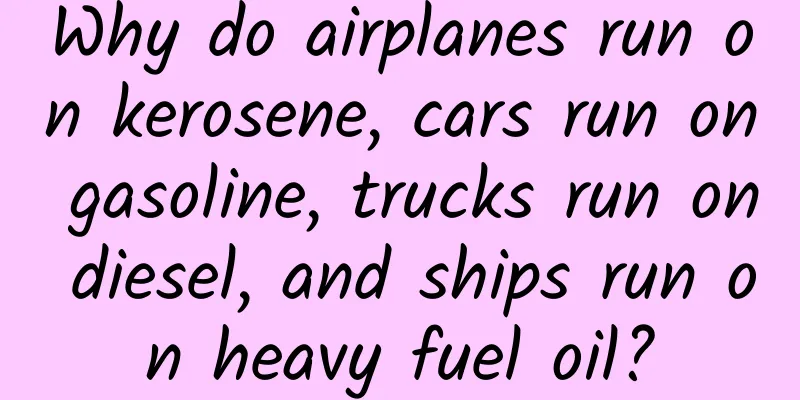Why do airplanes run on kerosene, cars run on gasoline, trucks run on diesel, and ships run on heavy fuel oil?

|
Why do airplanes run on kerosene, cars run on gasoline, trucks run on diesel, and ships run on heavy fuel oil? In a word, if a certain fuel can meet the use needs of a certain means of transportation to the greatest extent, then this fuel is the most suitable fuel for this means of transportation. Um... Are you a little confused? Please listen to me slowly... 1. Gasoline and Automobiles Gasoline is a lighter fraction of petroleum products. It has low density, low calorific value, and is volatile. It burns much faster than some heavy oils. It can be understood as the difference between igniting gunpowder and lighting firewood. The picture shows a gasoline engine Let's talk about engines. Compared with ships (cruise ships or military ships)/aircraft (passenger planes or fighter jets), the requirements for car engines in terms of book data are simply child's play, but the acceleration requirements are higher and the size cannot be too large. In particular, some sports cars have a 0-100km/h acceleration of less than 5 seconds, so the engine acceleration is required to be fast. The aggressive nature of gasoline is more suitable for car use. 2. Kerosene and airplanes The aviation kerosene used in airplanes is purified from naphtha, paraffin oil, etc. through multiple processes. Compared with the gasoline that is evaporated first, it is much more stable, with low density, high calorific value, and is not easy to evaporate. In the special combustion environment of the turbine, its burning speed is not slower than gasoline. The picture shows a five-cylinder radial engine The picture shows a turbofan engine There are many kinds of airplanes. Most of the airplanes used in World War II were radial internal combustion engines, which were reciprocating engines and mostly burned gasoline. Modern turbine engines were not applied to airplanes (first of all fighter planes) until the end of World War II, and the performance of fighter planes made a qualitative leap. Because gasoline is more volatile at high altitudes, it is unsafe to use it on airplanes (hit by a bullet = explosion), so kerosene with better performance (tens of thousands of revolutions) is used. In addition, kerosene has another advantage over gasoline in that it is not easy to deposit carbon, which is also extremely important for aircraft engines with high precision requirements. Why not diesel? It's simple. It burns too slowly (especially at high altitudes and low temperatures). How can an aircraft with poor maneuverability fight against an enemy? 3. Diesel and Trucks We say gasoline is aggressive, kerosene is cheerful, and diesel can be described as steady. It can be divided into light diesel (cars/trucks) and heavy diesel (heavy machinery/small and medium-sized ships). Compared with the former, the latter has a higher density, higher calorific value, higher ignition point, and is more viscous. Because of its relatively stable characteristics and low ignition point, it can be compression ignited without worrying about deflagration, and can be made into a very large combustion chamber, which is not the case with gasoline. Pictured is a large diesel engine For some ships and heavy machinery, because of the need for high loads, there is no requirement for speed increase, but the power and torque (especially torque) are very high. The high calorific value of diesel and the high compression ratio of the diesel engine can make fuller use of its energy. Although the speed cannot be increased, the power is strong, which is completely incomparable to gasoline engines. The picture shows a lightweight diesel engine For trucks and some family cars that use light diesel, since there is not much demand for acceleration performance, the advantages of light diesel engines over gasoline engines, such as simple structure, high reliability, and low fuel consumption, are prominent. In addition, diesel engines will also have carbon deposits, but diesel engines are not very sensitive to the adverse reactions of carbon deposits, especially heavy diesel engines, where the manifold is so thick that the impact of carbon deposits is completely insignificant. 4. Ships and Heavy Fuel Oil Heavy oil is the viscous substance left after most of the petroleum has been evaporated. It has high density and calorific value. A small bottle can burn for an hour or so. If there is not enough oxygen, it will produce black smoke (single carbon particles produced by incomplete combustion). The picture shows a steam turbine This kind of oil could not be used in internal combustion engines in the past because it could not be sprayed, so it was directly ignited after oxygenation, and then burned in boilers to drive steam turbines as power. Now that the technology is more mature, these heavy oils can be used in large two-stroke diesel engines on merchant ships, with a maximum speed of just over 100 revolutions. Because the lower the speed, the higher the efficiency, so it is more efficient than the main engine used in cars. Most importantly, heavy oil is very cheap, as the fuel consumption of ships is calculated by tons. However, the speed change performance of engines burning heavy oil is poor, so ships have to use diesel engines when entering the port to cope with frequent acceleration, deceleration and lane changes. |
<<: The realm of "stealing skills": creating oneself from classics | Yihai Shizhen
>>: Why have the Big Dipper remained together for thousands of years and not fallen apart?
Recommend
"Pink Killer" wanted poster, AI's ability to read breast X-rays is comparable to that of doctors
According to statistics from the World Health Org...
Detailed explanation of the Douyin agent operation service process
Account positioning 1. Filter user groups Through...
A busy city is also a paradise? A forest city that Tao Yuanming could never have imagined!
Let the forest enter the city, and let the city e...
24 sets of money-making business tips, you can use them right away, and you can earn over 10,000 yuan a month at home
24 sets of money-making business tips, you can us...
CG Zhong Fenghua game scene class video tutorial
CG Zhong Fenghua Game Scene Class Video Tutorial ...
These strange "pretenders" around us are actually very useful
The weather is getting cooler, and it is a good t...
Taiyuan SEO training: Why is website optimization ineffective? Why is SEO not ranked?
Many friends have just started SEO, but found tha...
Collect now! 22 super practical free Figma plugins
Editor's note: This article was originally pu...
How much does it cost to attract investment for the Wujiaqu Hotel mini program?
How much does it cost to attract investment in th...
If you are bitten by a dog, this trick can help you counterattack quickly!
Audit expert: Zhu Guangsi Member of Beijing Scien...
Internet + door-to-door service: How to play in this market with strong demand?
Penguin Intelligence | Research and Production Re...
Who is suitable for taking a nap? Why do some people feel dizzy when they wake up, while others feel relaxed?
"I can't remember how long it has been s...
If you are in a high-rise building and an earthquake occurs, should you run or not?
Xinhua News Agency, Beijing, March 29 (Reporter Z...
How did it come from and where is it going? Uncovering the development ideas of the Tianzhou series cargo spacecraft
When the Shenzhou spacecraft goes up to the sky, ...









